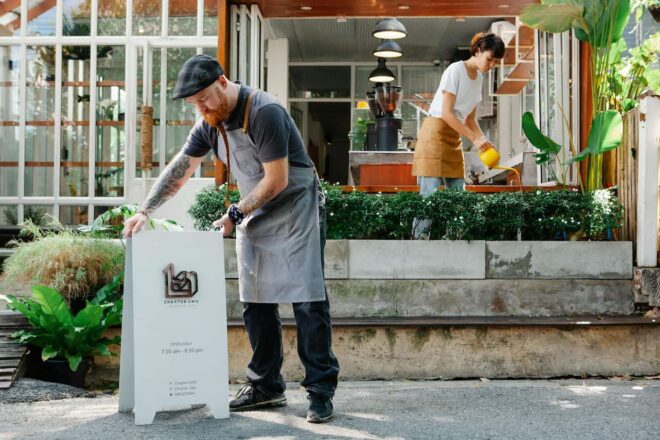Why your seasonal business needs an online presence
Editorial Team
7 min read
It’s the peak season for summer seasonal businesses. While many states have loosened restrictions, the spread of coronavirus has not slowed down. If COVID-19 has taught us one thing, it’s that every business needs an online presence—even those that are seasonal. Whether you specialize in manufacturing linen caftans or you run a food stand in a state park, customers need to be able to find you online.
Why an online presence is important for seasonal businesses
Time is of the essence for seasonal businesses. Because these types of businesses operate with a shorter window of profitability, they’re even more susceptible to the negative impacts of the coronavirus pandemic. An online presence can help your seasonal business in two ways. First, it can help bolster sales during your peak season. Second, depending on your product and/or service, an online presence may help you to stay profitable year-round. In this time of uncertainty, wouldn’t it be nice to have something constant you can rely on?
Whether you run a lawn service, a community pool, or a funnel cake food truck, there are advantages to operating online.
Communicate updates on operating hours & services
Clearly communicating expectations is key to maintaining customer satisfaction. Many businesses have updated their hours of operations or the services they offer to adjust to the coronavirus pandemic. Keep your customers in the loop by posting any operating updates on your website, Facebook page, and Google listing.
Effectively communicate your safety measures
The CDC recommends face coverings in areas where it’s difficult to socially distance. That includes restaurants, ice cream shops, retail stores, and myriad other seasonal businesses. Consider creating an additional section on your homepage or a new page on your site dedicated to the safety measures you’ve implemented. This lets your customers know that you’re taking their health and safety seriously, and it may help boost customer compliance.
For example, a community pool may share information about the lack of evidence that COVID-19 spreads through water or the measures they’re taking to disinfect the water with chlorine and bromine. While these chemicals may be part of proper pool management even without a pandemic, communicating health & safety protocols has become even more essential in these times. An online presence allows you to communicate your safety measures early and often, providing a safer atmosphere and a better customer experience.
Offer remote services
Businesses in general are adapting to physical distancing by providing remote services wherever possible. While you might have offered patio dining in previous years, this year you may want to offer cocktail kits or takeaway picnics so that people can continue to patronize your business even if they don’t yet feel comfortable coming back in person.
A digital presence can allow personal trainers to offer remote fitness training. Pet sitters can sell treats and toys or provide remote training lessons. With many platforms that allow you to integrate e-commerce into your website, it’s never been easier to incorporate online sales into your business.
Provide Online Ordering for takeout and dine-in
In the early months of the pandemic, many restaurants were limited to offering delivery. Now, diners are opting for a mix of delivery and takeout along with dining in. Yet, online ordering remains as essential as it was at the beginning of the pandemic.
Services like Clover Online Ordering allow restaurants to capitalize on a wider customer base without giving up control (or a hefty cut of the sales) to delivery apps. You can even use online ordering to increase the safety measures in your restaurant. Many restaurants are giving diners the option of viewing the menu from their phones so they don’t have to touch the menu. Take it the extra mile and let them order directly from their phones while dining in, and you limit the handling of credit cards and the time your servers have to spend in contact with patrons.
Increase your customer base when business is slow
You probably won’t see as much foot traffic this year as you’ve seen in the past. But that doesn’t necessarily mean a nosedive in revenue if you can adapt and integrate an online presence into your business model. A 1,000-person survey conducted in mid-March found that 42% of consumers were shopping more online. With platforms like Wix and Squarespace, you can build an eye-catching website in a few days, and often in an afternoon. The best part is that you’re not limited by geography, so you can broaden your customer base.
Let’s say a retail store in Nantucket relied on foot traffic from vacationers in years past. Now, with that foot traffic all but dried up, they’ve pivoted to e-commerce. With a website built for online sales, they can open their customer base on a national (or even international) level at a time when people are hungry to capture the feeling and mood of travel.
Ways to set up an online presence for your seasonal business
You can choose what your business needs—à la carte style—or you can go all in for a robust online business presence.
Website
A website operates as your digital storefront. It should be easy to find, easy to use, and ideally should match the look and feel of your brand.
If you built your website more than ten years ago, it’s definitely time for an update. A site refresh will likely improve loading time, a factor Google considers in its ranking algorithms. In addition to loading faster and coming up higher in search results, your site is more likely to increase conversion and lead to more sales if it has a more modern, up-to-date look and feel.
Whether you’re revamping an existing website or building one from scratch, there are several platforms and services that let you “click and drag” your way to a beautiful new website: Clover partners such as BigCommerce or other third-party services such as Shopify, WooCommerce, and many others.
Online shop or delivery options
The pandemic has shown us the importance of online shopping options. E-commerce is expected to increase by 18% in 2020. For the first time, even consumers 65 and older are making more purchases online, with a 12.2% increase in online purchases.
With a slew of fantastic tech options, small business owners don’t have to worry about building their own e-commerce platform. You can research the options available and choose the one that best fits your business needs. Plus, many web platforms make it a piece of cake to integrate online ordering into your business.
If your business isn’t currently listed on Google, you may want to drop what you’re doing and take care of that now. Google makes it easy to take control of your search engine listing—and that, in turn, allows you to update your operating hours and communicate with your customer base faster.
If you find it hard to keep your website updated consistently, Facebook provides an easy alternative. Create a quick post with updates, promotions, or changes to spread the word. If you don’t know how to set up a Facebook business page, you can find instructions here.
Preparing for next year
It’s never too early to start thinking about next year, or the next season. Here are a few marketing tips written specifically for seasonal businesses. Once you have your website set up, you can dedicate efforts to a blog. A blog will help you to continue to engage your audience, stay relevant, build your email list, and drive traffic to your website. When it comes time to reopen next year, you’ll be in a stronger position than ever.
Related Posts
Full Service Restaurants (FSR)
7 ways to attract more tourists & business travelers to your restaurant
Full Service Restaurants (FSR)
Restaurant terms you need to know
Popular Topics
Stay in touch
Sign up and learn more about Clover.
Thank you for your subscription!
More posts about starting a small business
eBook





